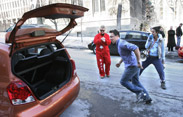Marketing the Wave

History and political science undergraduate Charlie Alovisetti had 15 seconds to try to find a lanyard hidden somewhere in the car for a prize. Johanne Marcoux timed him, and Yas Yeganegi wielded the bullhorn, both management students.
Owen Egan
From a distance, you could see a crowd of placard-carrying students mingling next to a barbecue. A student in an orange jumpsuit was shouting through a megaphone, and music blared from a hatchback. Was it a student protest or a party? When I neared the crowd, I was offered an orange lanyard that read "Pontiac Wave."
It turns out students protesting government cuts to funding happened to be circulating in front of the Student Union building just as Agency 412 - a virtual agency set up for an innovative hands-on marketing course - were setting up for an afternoon of promotional events. The lanyard referred to the two cars - one a lustrous burnt orange, the other an enticing candy red - parked nonchalantly in front of the barbecue. Passing students were enticed to explore the cars for hidden prizes, and fill out a questionnaire in return for a free hot dog.
Protesters mingling seamlessly amongst marketers: that's a dream come true for corporations trying to break into the notoriously leery sights of Generation Y.
"We don't like flash. We don't like car advertisements - and we hardly even watch TV," says Tingi Ko, Agency 412's PR representative.
Kurt Olson, who works in Conquest Marketing for GM Canada, knows this all too well. "This generation doesn't like to be marketed to. They've been exposed to so many media messages, advertising and promotions... it just doesn't resonate with them."
So GM has teamed up with EdVenture Partners, a U.S.-based enterprise that has been matching corporate clients with universities and colleges for five years. This is the first time McGill has been part of the program.
The EdVenture Partners website promises that "with a real budget provided by the client, your students will execute their marketing strategy by incorporating research, advertising, public relations, event marketing, sales promotion and any other means they believe will deliver results." Corporate partners offer students a budget of $3,100 to produce their campaign. The students are also provided with EdVentures' guide outlining the to-do list for the agency teams.
Professor Demetrios Vakratsas oversaw the process. Three overall coordinators were elected, and students divided up into teams: strategy, PR, advertising and finance. Says Vakratsas, "Eventually students took ownership of the course. They were coordinating and running class discussions, so I was essentially a moderator."
Agency 412 (named after the group's classroom) was born to achieve two goals: increase awareness of the Pontiac Wave and increase purchase intentions.
It turned out to be more work than some might have anticipated. Says Stephanie Han, of the strategy team, "A lot of things depended on exterior, environmental elements." Approval had to be obtained from GM for any use of the corporate brand. GM could not be associated with alcohol, so the agency, who brought McGill bands to Gert's for the two-day event, had to pay the bar not to serve alcohol.
Some of the ideas that had to be rejected included a Guinness World Record≠breaking human wave breaking over McGill campus that would have taken 6,000 people. Another called for handing keys out to media: the media personality whose key successfully started the car would get to donate the car to the charity of their choice. But GM wouldn't provide a car.
Such is life - and that's just the point. Dealing with the red tape, says Han, "you get more of a feel of how it would be in the real world."
The students impressed their professor and EdVenture project coordinator Jason Butchko with their tenacity and flexibility. "Sometimes you gotta go with plan B," says Vakratsas. The logistic hurdles "got them thinking on their feet all the time; that was the greatest thing." It all came down to "ingenuity, resources and contingency planning."
On his return home after the event, Butchko wrote in an email that the McGill students "showed many skills in rolling with the roadblocks and were able to adapt their campaign to whatever came along." He attributes this success to their use of distinct, independent components, like a poster campaign early on that introduced a slogan ("Stand Out"), the barbeque and the bands at Gert's. They didn't have to worry that one mess-up would cause a domino effect.
Ben Kaye and Yassi Mohseni, who both worked in the finance division, had similar reactions. Says Kaye, "This was an application of everything we learn in four years of university. It's real life."
Mohseni's enthusiasm was representative of the general mood amongst the group. "You get to be involved with every single part of the process, from beginning to end. It's cool to have your input into everything."
What about those questionnaires students filled out in return for a free hot dog? EdVenture Partners' website promises corporate clients that students will deliver "what every marketer dreams of: results - developed by the target audience for the target audience." The last leg of Agency 412's campaign is a follow-up report. All this information will be delivered to GM.
Mark Chiarcossi, one of the three coordinators, was pleased with the results he saw on the first day of the two-day event. There had been that crowd of protestors to kick things off. A lot of forms had been filled out, and, though the agency's preliminary research had shown that students weren't interested in hatchbacks, they were "getting the cheeks in the seats."
Overall, it's a good deal for the students, who, as EdVenture Partners points out, now have a real marketing campaign on their resumés, and definitely for GM, who will have low-cost market research on a particularly skittish consumer group. It remains to be seen if McGill students who buy a Pontiac Wave will be equally pleased.
